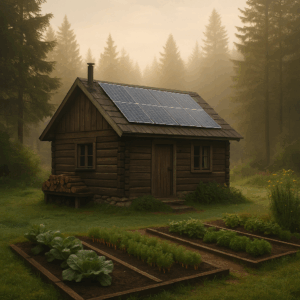Common Mistakes to Avoid When Preparing for an Off-Grid Lifestyle
Embarking on an off-grid lifestyle can initially seem daunting, particularly for those accustomed to the conveniences of modern living. A common mistake among beginners is diving in without a clear plan, leading to unnecessary stress and setbacks. Preparing for off-grid living involves not only practical steps but also a mindset shift toward simplicity and resilience. With the right guidance and a focus on low-cost steps, you can confidently embrace this transformative journey. Join us as we explore common pitfalls and share actionable self-sufficiency tips to help you start your path toward intentional, sustainable living.
Embrace the Off-Grid Mindset
Transitioning to an off-grid lifestyle requires more than just physical preparations. It demands a fundamental shift in our thinking about relationships with resources, technology, and the environment. Let’s explore the mental adjustments that will set you up for success.
Shifting from Convenience to Capability
The journey to off-grid living begins with a pivotal mental shift—moving from a mindset of convenience to capability and self-reliance.
In our modern world, we’ve grown accustomed to instant gratification and easy solutions. Off-grid living challenges this norm, calling us to develop skills and patience. It’s not about giving up comfort but finding fulfillment in your abilities.
This shift often leads to a deeper appreciation for resources. When you’re directly responsible for your water, power, and food, you naturally become more mindful of consumption. As noted on The Life Off Grid blog, many off-gridders report feeling more connected to their environment and more satisfied with their daily lives.
Remember, this transition is a journey. Be patient with yourself as you learn and grow into this new mindset.
Cultivating a Resilient Attitude
Resilience is the cornerstone of successful off-grid living. It’s about adapting to challenges and bouncing back from setbacks with a positive outlook.
Off-grid life will present unexpected hurdles. Perhaps your solar panels underperform during a cloudy week, or your first garden yields less than expected. These moments aren’t failures; they’re opportunities to learn and improve your systems.
Cultivating resilience means:
-
Embracing problem-solving as an exciting challenge
-
Viewing setbacks as valuable learning experiences
-
Developing a flexible approach to daily life
-
Building a supportive community of like-minded individuals
As shared in The Life Off Grid’s story, many who embrace this lifestyle find that overcoming challenges leads to personal growth and a sense of accomplishment that’s hard to match in conventional living.
Practical Steps to Start Off-Grid Living
Now that we’ve addressed the mindset, let’s dive into practical actions you can take to begin your off-grid journey. These steps will help you build a solid foundation without overwhelming your resources or skills.
Low-Cost Essentials for Beginners
Starting your off-grid journey doesn’t have to break the bank. There are many affordable ways to begin building your self-sufficiency skills and systems.
One of the first steps is to focus on reducing your energy consumption. This not only prepares you for off-grid living but also saves money in your current situation. Start by replacing traditional bulbs with LED lights and unplugging devices when not in use.
Water conservation is another crucial area. Install low-flow faucets and showerheads, and consider collecting rainwater for non-potable uses like watering plants or cleaning outdoor areas.
For food independence, start small with a herb garden or a few vegetable plants. This allows you to learn about growing food without a significant investment. As your skills improve, you can gradually expand your garden.
Building Self-Sufficiency Skills
Developing a diverse skill set is crucial for off-grid success. Focus on learning practical abilities that will serve you well in your new lifestyle.
-
Start with basic DIY skills: Learn simple home repairs, woodworking, and how to maintain tools.
-
Explore energy systems: Understand the basics of solar power, wind energy, and battery storage.
-
Learn about water management: Study rainwater collection, filtration methods, and greywater systems.
-
Develop food preservation techniques: Master canning, dehydrating, and fermenting to extend your harvest.
Remember, building these skills takes time. Be patient with yourself and celebrate small victories along the way. Many off-grid communities, like those on Reddit’s Off-Grid forum, share valuable tips and encouragement for beginners.
Common Mistakes and How to Avoid Them
As you embark on your off-grid journey, being aware of common pitfalls can save you time, money, and frustration. Let’s explore some frequent mistakes and how to sidestep them.
Overlooking Sustainable Practices
A common error in off-grid living is focusing solely on independence without considering long-term sustainability. This oversight can lead to resource depletion and environmental damage.
Sustainable practices are the backbone of successful off-grid living. They ensure that your lifestyle not only meets your needs but also preserves the environment for future generations. This includes thoughtful waste management, responsible land use, and eco-friendly building practices.
One key area often neglected is soil health. Many newcomers to off-grid living overlook the importance of maintaining and improving soil quality for long-term food production. Composting, crop rotation, and natural pest control methods are essential skills to develop.
Water management is another critical aspect. Implement systems for rainwater harvesting, greywater recycling, and efficient irrigation to ensure a sustainable water supply.
Underestimating Energy Needs
One of the most common mistakes in off-grid living is underestimating the amount of energy required for daily life. This can lead to frustration and unexpected costs down the line.
To avoid this, start by conducting a thorough energy audit of your current lifestyle. List all the appliances and devices you use regularly and their energy consumption. This will give you a realistic picture of your needs.
Next, research efficient alternatives for high-energy appliances. For example, replacing a traditional electric stove with a propane model can significantly reduce your energy requirements.
When planning your off-grid energy system, always overestimate your needs by at least 20-30%. This buffer will account for cloudy days, increased usage, and system inefficiencies. As noted in EcoFlow’s blog, many off-grid beginners regret not investing in a larger energy system from the start.
Remember, your energy needs may change seasonally. Plan for these fluctuations in your system design.



